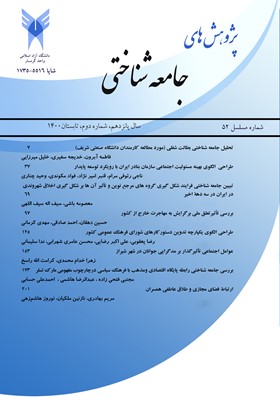تحلیل جامعه شناختی بطالت شغلی (مورد مطالعه کارمندان دانشگاه شریف)
محورهای موضوعی : در این فصلنامه موضوعات جامعه شناختی در اولویت چاپ هستند و موضوعات نزدیک به جامعه شناسی در اولویتهای بعد قرار می گیرندفاطمه آبرون 1 , خدیجه سفیری 2 , خلیل میرزایی 3
1 - دانشجوی دکتری رشته جامعه شناسی، واحد علوم تحقیقات، دانشگاه آزاد اسلامی تهران، ایران
2 - استاد گروه علوم اجتماعی، دانشکده علوم اجتماعی و اقتصاد، دانشگاه الزهرا، تهران ، ایران.
3 - عضو هیات علمی گروه جامعه شناسی، واحد رودهن، دانشگاه آزاد اسلامی، تهران، ایران.
کلید واژه:
چکیده مقاله :
بطالت در سازمان یک رفتار عامدانه و نوعی تقلب شایع است که ممکن است همه کارکنان سازمان در همه سطوح به نوعی مرتکب آن شوند. این پژوهش با هدف بررسی علل و زمینه های بوجود آورنده بطالت، در میان کارمندان دانشگاه صنعتی شریف انجام شده است. روش پژوهش نظریه داده بنیاد می باشد که داده های مورد نیاز آن از طریق مصاحبه نیمه ساختار یافته با 35 نفر از کارمندان انجام شده است. شیوه انتخاب مشارکت کنندگان، هدفمند و تعیین تعداد آنها با رسیدن به مرحله اشباع، مشخص گردیده است. از مجموع 665 داده ی خام، 385 مفهوم، 35 خرده مقوله و 14 مقوله اصلی از داده های اولیه استخراج گردید. در نهایت مفهوم "اتلاف وقت سازمان یافته" ، به عنوان پدیده اصلی که بقیه مقولات را پوشش می داد، انتخاب گردید. نتایج این پژوهش نشان داد که مهم ترین عامل به وجود آوردن حس بطالت و فرسودگی شغلی در مشارکت کنندگان، "بی انگیزگی و بی هویتی شغلی؛ تنوع وظایف و روتین و تکراری بودن کار"، می باشد. این نارضایتی در نتیجه تبعیض سازمانی؛ فساد اداری سازمان یافته؛ مدیریت بیمار و دیوانسالاری پر هزینه به وجود می آید که پیامدهایی مانند؛ پیامدهای بطالت (خیانت، تورم پرسنلی، در جا زدن)؛ زیر پوستی شدن بطالت و پایین آمدن راندمان سازمان را در پی دارد. نتایج این پژوهش نشان می دهد که، اصلی ترین و بنیادی ترین عامل به وجود آمدن بطالت در سازمان ها، اتلاف وقت سازمان یافته می باشد که مربوط به عدم بازنگری در قوانین و آیین نامه ها و بخشنامه های مرتبط با سازمان می باشد.
Sociological analysis of job idleness (case study of Sharif University staff)Fatemeh AbrunPhD student in Sociology, Research Sciences Branch, Islamic Azad University of Tehran, IranKhadijeh SafiriProfessor, Department of Social Sciences, Faculty of Social Sciences and Economics, Al-Zahra University, Tehran, Iran. (Responsible author) kh.safiri@alzahra.ac.irKhalil MirzaeiFaculty memberDepartment of Sociology, Roodehen Branch, Islamic Azad University, Tehran, Iran.Idleness in the organization is a deliberate behavior and a kind of fraud that all employees of the organization at all levels may commit in some way. The aim of this study was to investigate the causes and contexts of idleness among the employees of Sharif University of Technology. The research method is data foundation theory, the required data of which has been done through semi-structured interviews with 35 employees. The method of selecting the participants is purposeful and determining their number after reaching the saturation stage is specified. From a total of 665 raw data, 385 concepts, 35 subcategories and 14 main categories were extracted from the primary data. Finally, the concept of "organized waste of time" was chosen as the main phenomenon that covered the rest of the categories. The results of this study showed that the most important factor in creating a sense of idleness and burnout in participants is "lack of motivation and job identity; variety of tasks and routines and repetition of work." This dissatisfaction is the result of organizational discrimination; Organized corruption; There is costly patient management and bureaucracy with consequences such as; Consequences of vanity (betrayal, personnel inflation, misplacement); Subcutaneousness leads to idleness and reduced efficiency of the organization. The results of this study show that the main and fundamental cause of idleness in organizations is the waste of organized time, which is related to not reviewing the laws and regulations and directives related to the organization. Is.
_||_


